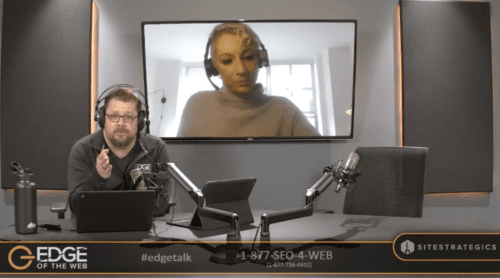Our special guest for episode 351 of the award-winning EDGE of the Web podcast was Lily Ray, SEO Director at Path Interactive. Host Erin Sparks spoke with Lily about the ways in which search behavior of users is changing in the midst of the novel coronavirus and COVID-19 pandemic. Here’s what we learned:
Lily Ray: Her Background and Experience

When Lily Ray isn’t being the Director of SEO for Path Interactive, she’s a busy deejay in New York City, and during the pandemic she’s been doing livestream deejay fundraisers from her apartment and donating the proceeds to a variety of charities and businesses around New York. In her day job at Path Interactive she’s providing strategic leadership for all of their SEO client programs. She started in on SEO back in 2010 working with a variety of fast-paced startups and Fortune 500 companies, with experience in a variety of industry verticals.
Lily found SEO while she was in college during the Great Recession. During her junior year at NYU she was seeing many graduates struggle to find jobs when she came across a social media marketing job. With her background in tech thanks to her family (her brother is a web developer and her father is an engineer), and she immediately fell in love with the work and it led her into SEO as things like Google Analytics came along and agency SEO has been her thing ever since.
Early on she found great success with black hat SEO techniques (link-building, backlinks, etc.), but then along came the Google Penguin Update that brought all of that to a screeching halt, which allowed her to discover how much more she enjoyed white hat SEO and sharing knowledge with others to get positive results the right way. It’s more authentic and creative.
Google’s Epic Fight Against Bad Information
Google is really trying to do everything it can to make sure the information users get through their search engine is good information. That’s why the big YMYL (your money, your life) update in August 2018, and their push for more E-A-T (expertise, authoritativeness, trust) have been so important. And now with the coronavirus pandemic, it’s a real litmus test of whether or not everything they’ve been trying to do is working or not. It reveals that Google still has a lot of challenges, just like every big platform in social media is struggling with how to deal with misinformation. It feels like an impossible task. They’re all trying to figure it out.
When a new piece of content related to coronavirus appears, maybe it seems like it might be true and people are looking at it and sharing it and linking to it and it starts to rank, but then Google and other search engines have to do another layer of scrutiny to see if it’s really true or not because they have to try to prevent misinformation, even though they’ve admitted they cannot use their algorithms to verify accuracy. Their algorithms can’t fact check. And it’s interesting to see that Google seems to be doing a pretty good job of it, or at least better than Bing where more misinformation has been surfacing than you’d want to see.
How Does Google Handle Huge Changes in Search Demand?
Google definitely has certain systems in place to handle something that suddenly becomes very newsworthy, or a drastic change in search intent. No one knew how the entire nation would suddenly be in a stay-home situation and not able to go out and do their normal activities like going to the gym. Everyone’s trying to do everything from home and online. The way this impacts search is that for places where before your results would include physical places, those aren’t ranking now if they’re closed. So a previous search for art courses or classes would have seen the number one and number two results being a university that offered classes and a museum that offered classes. But they’re both closed because of the pandemic. So now those top two positions are purely online offerings for art classes, whereas before they would have been farther down in the rankings.
This is being seen all across search results. And you don’t have to specify “virtual” or “online” in the search because Google is trying to only present you with what’s actually available, which right now is online only. The change in rankings wasn’t necessarily because the online companies were doing anything different but because Google chose to rank the results differently because of the pandemic and stay-home orders. Those companies were just in the right place at the right time. It’s not about keywords, it’s about Google trying to understand intent as well as the broader context of what’s happening.
So now the companies who can adapt their normal brick-and-mortar business into some kind of offering online or a combination of online with curbside pickup or home delivery, can get some of their visibility back because Google will notice how they’re adapting to being more online. Movie theaters lost a lot of visibility, but some are getting more of it back because their using their websites as gateways or portals for digital streaming of the movies they were previously planning on showing, they get a little slice of revenue for serving as that gateway, and people want to support their favorite local theaters.
When users search for anything medical or health-related, they’re going to end up getting a lot of COVID-related content from Google, even if that’s not what they’re looking for, and all the medical and health sites that don’t have a lot of COVID-related content are being pushed down in terms of rankings, visibility and therefore traffic because Google rightfully has to push the COVID content because we’re in the middle of a global pandemic. So a lot of companies just have to understand that the “real estate” available on SERPs is very different right now. And it might not be treating them very well. Wikipedia has definitely been pushed aside, the problem there being is that anyone can edit it, so it can’t automatically be assumed to be a trustworthy source of information.
Before the pandemic if you searched on meeting rooms or conference rooms, you would have seen top results being physical rooms available for meetings, but now the assumption is that these all have to be virtual, so what you see now are the video conference platforms like Zoom. So basically anything that can be done virtually right now is going to be much more prominent in the SERPs. Same thing with classes and courses. Sites that are about having virtual parties from home that had very little visibility before are now at the top of the rankings and results, like houseparty.com and NetflixParty.com. Or being able to recovery meetings online like Alcoholics Anonymous have seen the biggest jumps of all because people in recovery have to find their support online now.
To what extent should websites be publishing COVID-related content? There’s nothing wrong with having your company making a statement about its COVID response, or a message from the CEO. But if there’s anything that appears to be trying to take advantage of the pandemic or seems even slightly unethical, or advertising that leverages the pandemic into sales, anything like that will get you into trouble. A lot of companies are over-doing the communication with their email lists. Put your COVID response information on a page of your website and stop hammering your email lists with it. It’s too much. It’s tough because as SEOs and marketers, we think it’s always our job to always be communicating and reaching out to our audience, but right now is a time to maybe pull back just a little bit. Do some good charity work to support those who are struggling. Businesses need help, and our digital marketing community can help. It’s easy to slip into over-marketing at a time that really isn’t right for it. Do some charitable work and that will still very much support your branding and marketing because people will remember that you did good things in a time of crisis.
In the midst of this crisis, SEO has such a critical role to play. In some cases, we are the ones who are helping businesses pivot to keep going. We are actually saving some businesses, and that is a thrilling place to be. And make no mistake, a big chunk of this switch to virtual and online ways of doing things is going to stick around even after the pandemic.
Connect with Lily Ray and Path Interactive
Twitter: @lilyraynyc (https://twitter.com/lilyraynyc)
LinkedIn: https://www.linkedin.com/in/lily-ray-44755615/
Instagram: @lilyraynyc (https://www.instagram.com/lilyraynyc/)
Website: http://lilyray.nyc
Path Interactive: https://www.pathinteractive.com
PI Twitter: @PathInteractive (https://twitter.com/PathInteractive)
PI Facebook: @pathinteractive (https://www.facebook.com/pathinteractive/)
PI LinkedIn: https://www.linkedin.com/company/path-interactive/
Need a Spot-Check on Your Digital Marketing ROI?
When’s the last time you got the real story on your digital marketing ROI? Find out where it’s at with a Site Strategics report examining your SEO, content, social media, and PPC. Visit https://edgeofthewebradio.com/roi to get 30% off a comprehensive review of your digital assets!


